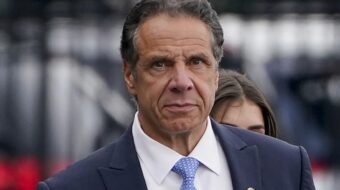AUSTIN, Texas – Calling George W. Bush’s campaign promises “a false image, a mirage,” Raul Yzaguirre, president of the National Council of La Raza (NCLR), called on Latinos in the United States to register and vote in support of their communities. Yzaguirre’s comments were made during the annual conference of his organization, held here from July 12-15.
Yzaguirre noted at the opening plenary, titled “The State of Hispanic America,” that Latinos are over-represented in the U.S. Armed Forces and have “fought hard for democracy. Now democracy has to work for us.” He said that Latinos “seek nothing less than the chance to control our own destiny.”
Interrupted by applause, Yzaguirre criticized what he termed “piñata politics,” where political candidates campaign for the Latino vote by “taking as many pictures with us as possible” and speaking a few words of Spanish, instead of dealing with the issues that affect the Latino population.
He criticized the Bush administration, saying that its policies towards Latinos represent “two years of neglect, disinterest, and disrespect.” Yzaguirre ticked off a list of Bush policies that he said show that “the Bush administration doesn’t seem to care” if Latinos benefit from democracy. The tax cuts were “dramatically tilted towards the wealthy, excluding millions of hard-working Latino families. … Bilingual education, English as a Second Language, and parent involvement were cut to the bone.”
With approval from conference participants, Yzaguirre lashed out at Attorney General John Ashcroft’s attack on immigrants’ democratic rights, saying these attacks are “what alarms me the most. Because our skin may be different, or because we speak with an accent, we are back to being the enemy.”
Recalling the struggles of years gone by, Yzaguirre said, “We know how to fight when our country is threatened. … It’s time to fight when our community is threatened.” Saying that “voting is not enough,” he urged the organizations represented here to register the 7.3 million Latino citizens who are not yet on the voting rolls, and to mobilize “the 1.6 million registered Hispanic voters [who] did not go to the polls in 2000.”
Democratic presidential candidates Howard Dean and John Kerry addressed the meeting and received enthusiastic applause. President Bush, while invited, did not attend.
In a workshop called “Mobilizing the Latino Vote,” Clarrisa Martínez de Castro, NCLR director for state and local public policy, noted that because the electorate seems to be evenly divided, Latinos can be a swing vote because they tend to vote on issues rather than by party affiliation. She rejected the concept that some have put forth that it is part of Latino culture to abstain from voting, noting the high voter turnout in Mexico and Puerto Rico. She said that even non-citizen immigrants “can and have gotten three to five voters out to vote” that they know.
A joint program that the NCLR runs with the National Association of Latino Appointed and Elected Officials (NALEO) and the offices of the Puerto Rican government in the U.S. found that, among Latino registered voters who have nevered voted or who haven’t voted in four years, 8-12 percent will come out and cast their ballot when they are approached on the issues, according to María de la Luz García, head of NALEO’s get out the vote effort.
Political analyst Sergio Bendixen echoed that sentiment and added that Latinos tend to come out to vote when they feel threatened. “In the vote to defeat Pete Wilson,” he said, “a higher percentage of Latinos voted than lawyers and show business professionals.” He said that the Latino vote goes down when there is a “lack of an enemy like Pete Wilson or Newt Gingrich.”
Bendixen pointed out that there was an upsurge of Latinos who came out to vote for Antonio Villaraigosa when he ran for mayor of Los Angeles. In contrast, in the New York mayoral race, many Latinos refused to vote for Mark Green after he attacked fellow Democratic candidate Fernando Ferrer in the primary.
Bendixen criticized the fact that the 50 percent increase in the Latino population has resulted in only three more Latino members of Congress. He said this was due to the redistricting following the 2000 census.
In the workshop on “Continuing the Latina Movement,” Lulu Flores, vice president for diversity and outreach of the National Women’s Political Caucus, spoke on the need to train Latinas to run for office so as to be able to provide better leadership in the communities.
The growing Latino population in the South received special attention at the conference. According to Lynda Barros, director of NCLR’s Emerging Communities Initiative, additional resources are
required “in response to the growing [Latino] numbers in the Southeast.”
The author can be reached at j.a.cruz@comcast.net









